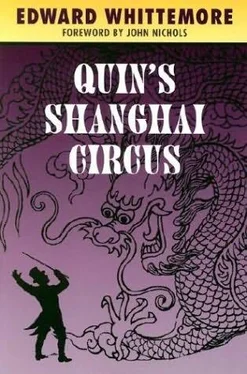Edward Whittemore - Quin’s Shanghai Circus
Здесь есть возможность читать онлайн «Edward Whittemore - Quin’s Shanghai Circus» весь текст электронной книги совершенно бесплатно (целиком полную версию без сокращений). В некоторых случаях можно слушать аудио, скачать через торрент в формате fb2 и присутствует краткое содержание. Жанр: Фэнтези, на английском языке. Описание произведения, (предисловие) а так же отзывы посетителей доступны на портале библиотеки ЛибКат.
- Название:Quin’s Shanghai Circus
- Автор:
- Жанр:
- Год:неизвестен
- ISBN:нет данных
- Рейтинг книги:3 / 5. Голосов: 1
-
Избранное:Добавить в избранное
- Отзывы:
-
Ваша оценка:
- 60
- 1
- 2
- 3
- 4
- 5
Quin’s Shanghai Circus: краткое содержание, описание и аннотация
Предлагаем к чтению аннотацию, описание, краткое содержание или предисловие (зависит от того, что написал сам автор книги «Quin’s Shanghai Circus»). Если вы не нашли необходимую информацию о книге — напишите в комментариях, мы постараемся отыскать её.
Quin’s Shanghai Circus — читать онлайн бесплатно полную книгу (весь текст) целиком
Ниже представлен текст книги, разбитый по страницам. Система сохранения места последней прочитанной страницы, позволяет с удобством читать онлайн бесплатно книгу «Quin’s Shanghai Circus», без необходимости каждый раз заново искать на чём Вы остановились. Поставьте закладку, и сможете в любой момент перейти на страницу, на которой закончили чтение.
Интервал:
Закладка:
Who was there?
Adzhar for one. Adzhar the incredible linguist. How did he ever survive the roads where life took him? No matter, he did, and someday I thought those roads would lead me to the pine grove I’ve always wanted to find, a quiet grove on a hill above the sea, no more than a soul deserves after lurking forty years in the locked, shuttered rooms of Asia. But no. Adzhar in his simplicity was too complex for them, his simple faith in love was beyond their comprehension. The fools were delirious on dragon piss and confiscated everything.
Who was Adzhar?
You’re right there, who was Adzhar and who was Lamereaux? And who was Baron Kikuchi for that matter? The picnic was held near his estate after all, saints preserve us. They say he was the most feared man in the Kempeitai and I’ve no reason not to believe them, but who was I? Who was I then and who am I now? And who was Edward the Confessor? Go ahead, tell me that.
Adzhar, buffalo. Who was he?
A reindeer from Lapland, a dragon from every country in the world. I didn’t know him, I only knew him through his work, his legacy to me. Other people knew him that way too. He and Lamereaux were good friends then. Why? Who can say. Who can fathom why people watched those worthless films I bought in Mukden? Who can say why those films led to a cemetery in Tokyo, why the cemetery led to two bottles of Irish whiskey in Lamereaux’s Victorian parlor, why two bottles of Irish whiskey led to a picnic on a beach south of Tokyo. A beach? Kamakura of course.
You said there were four people at the picnic.
Exactly four, definitely four. The trinity plus one? Three men and a woman? The trinity in gas masks so the secret conversation could not be overheard? The fourth presence not bothering with a gas mask, instead concerning herself with the blanket and the food and the comfort of the other three? Yes, that’s what Lamereaux told me the night we made our suffering journey through two bottles of Irish whiskey.
Adzhar and Lamereaux. Who were the other two?
Ask your man, he would know because he was there. Fools say he became a drunkard when he was interned in the mountains, but that’s because they can’t sniff a change in the wind, they can’t feel it coming, they like to think it happens quickly. An hour ago? Yesterday at the latest? Eight years ago is more like it and fifty years ago is even more like it. And as for those little boys he knew, he loved them like a father. Why not? He was and is so ordained by the Almighty.
Buffalo, when was the picnic?
At the onset of an era given to murders and assassinations, a time when a hunger for human flesh rumbled in men’s bowels. Look what happened in Nanking where a sergeant strangled his own commanding general. When he told me that on the beach, I knew I was hearing a voice direct from the rectum of lunacy. No one but me would probably ever believe such a voice, but that doesn’t matter now. A long time ago I destroyed the evidence, destroyed the only report the Kempeitai had on it.
On what?
The spy ring. The report was short, no more than a paragraph or two. That sergeant had gone mucking around in the rectum of his lunacy and killed the courier they caught, beat him to death, murdered the only source of information they had before there was time to get anything worthwhile out of him.
Spy ring. What spy ring?
My God, nephew, isn’t that what we’re talking about? The spy ring run by Lamereaux? The man who saved Moscow from the Germans? The hero who shortened the war in China and saved millions of lives? Worthless films, a cemetery, two bottles of Irish whiskey, a picnic for the trinity plus one? That’s the path Lamereaux and I were on thirty years ago. What path? The path at our feet, nephew, the path that runs from a whiskey bar in the Bronx to a turnip bar in Tokyo, that begins right here beside a vacant lot where dreaming poets pass themselves off as sleeping scavengers. My doctors have warned me to be careful of the night air, my condition is delicate at best. Another glass of dragon piss is what we need now, then perhaps we’ll be able to find a barge and float our souls down the river to the sea, through the mist and vapors we see rising from our vessel, not really a pushcart. Steam, you call it? The breath of boiled turnips? Saints preserve us, nephew, you better examine more closely the shores where we pass.
Geraty emptied one glass after another. Quin forced him to eat, forced him to answer questions, forced him to sit up when his head sank toward the counter. The fat man muttered and swore, laughed, lied when there seemed no reason to lie, and then corrected himself before wandering off on some byway of his four decades of travel through Asia.
He recited Manchurian telephone numbers and Chinese addresses, changed costumes, sang circus songs, beat a drum and played a flute, consumed bowls of horseradish and mounds of turnips, sneaked through the black-market district of Mukden late in 1934 and again in 1935, noting discrepancies, brought out all the peeling props and threadbare disguises of an aging clown working his way around the ring. Grinning, weeping, he eventually revealed how he had discovered thirty years ago that Lamereaux was the head of an espionage network in Japan, a network with such an ingenious communication system it was the most successful spy ring in Asia in the years leading up to the Second World War.
The information had come to Geraty by chance because he happened to fall asleep in a Tokyo cemetery.
At the time he was planning a trip to the mainland, ostensibly to sell patent drugs. His real interest, however, was in acquiring pornographic movies that could be sold at a large profit in Shanghai. Since the military had come to power in Japan these movies could be found nowhere in the country, but there were rumors that when the Japanese army had seized Manchuria a few years before, they had confiscated a large supply of them, probably from a White Russian entrepreneur.
Geraty made inquiries and was finally introduced to a young Japanese army corporal, on leave in Tokyo, who worked as a film projectionist in a unit stationed near Mukden. The corporal, little more than a boy, said the films could be provided for the right sum of money. The amount named was far more than Geraty had.
At this point Geraty’s story became confused. Although he would not admit it outright, it appeared he had stolen the money.
Worse, he was particularly ashamed of the source of the stolen money. He cried uncontrollably in front of Quin and insisted on whispering in a voice so low Quin couldn’t hear him. He was talking to his saints, he said. At least half an hour went by before Quin could get him to resume his account.
A meeting between the corporal and Geraty had been arranged for a Tokyo cemetery, one of the few places where a Japanese and a foreigner could still safely transact illegal business. Geraty was to bring the money, and the corporal in turn would tell him where the films would be cached for him in Mukden.
Geraty took a circuitous route through the cemetery and met the corporal behind a mausoleum. The deal was settled and the corporal left. Geraty had gotten very drunk before coming to the cemetery, obviously because of the stolen money he had just given away. It was a warm evening. After the corporal left, Geraty leaned against the mausoleum and wept. A minute later he was asleep on his feet.
Some time passed. He awoke in a heavy sweat, unable to remember where he was or how he had gotten there. He stumbled between the gravestones until he heard a man’s voice, whereupon he dropped behind a stone to hide. He was lying on his stomach and it was impossible to make out anything in the darkness.
The clouds suddenly parted. Geraty was astonished to see the young boy he had just met, the corporal from the unit near Mukden. In the corporal’s hand was the packet of money Geraty had paid over for the films. The boy was holding out the packet as if to give it to someone. The packet disappeared, the corporal turned and dropped his trousers. He bent over a tombstone, baring a slender bottom to the moon and whoever else was there.
Читать дальшеИнтервал:
Закладка:
Похожие книги на «Quin’s Shanghai Circus»
Представляем Вашему вниманию похожие книги на «Quin’s Shanghai Circus» списком для выбора. Мы отобрали схожую по названию и смыслу литературу в надежде предоставить читателям больше вариантов отыскать новые, интересные, ещё непрочитанные произведения.
Обсуждение, отзывы о книге «Quin’s Shanghai Circus» и просто собственные мнения читателей. Оставьте ваши комментарии, напишите, что Вы думаете о произведении, его смысле или главных героях. Укажите что конкретно понравилось, а что нет, и почему Вы так считаете.












